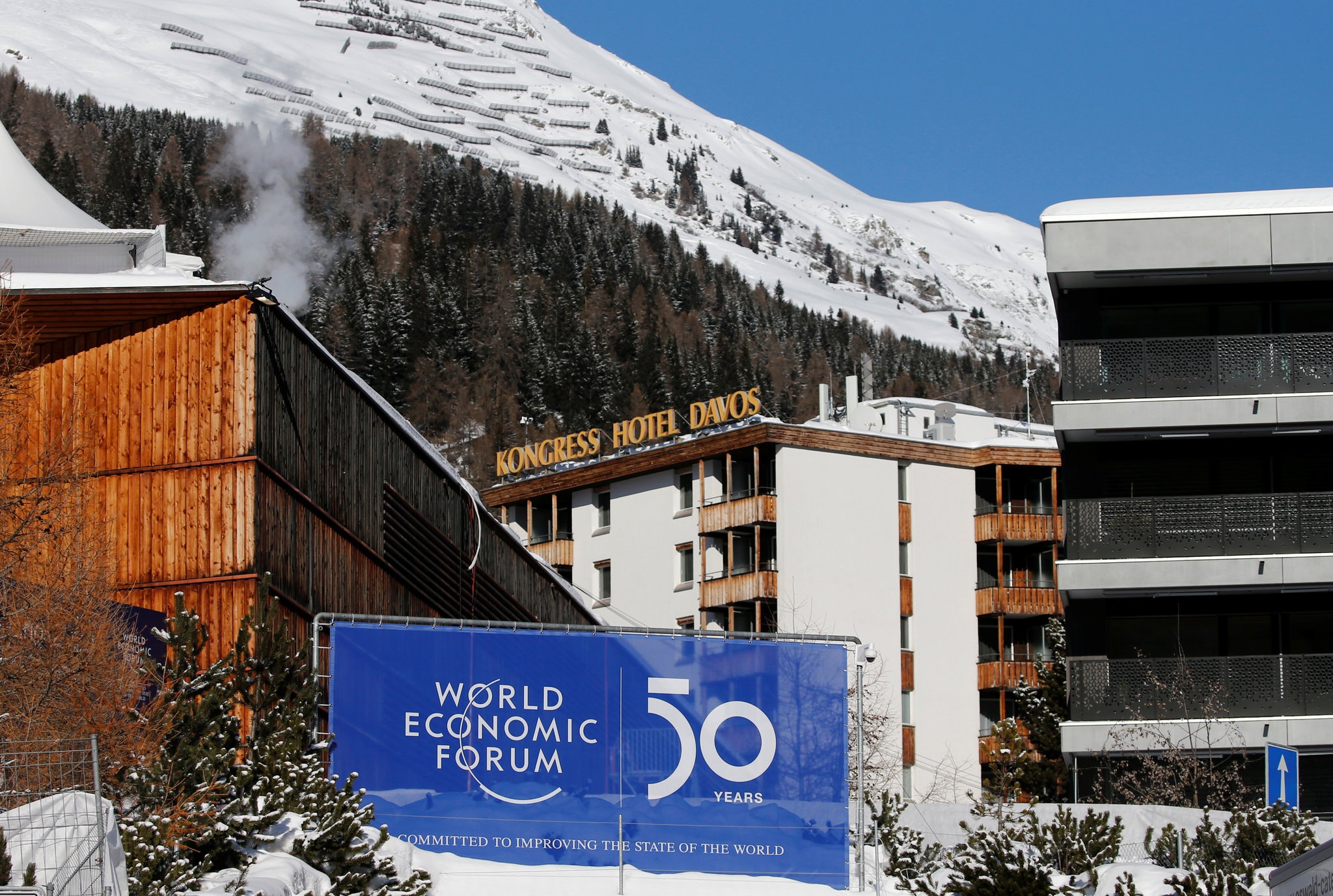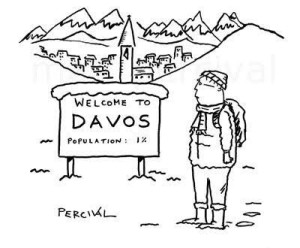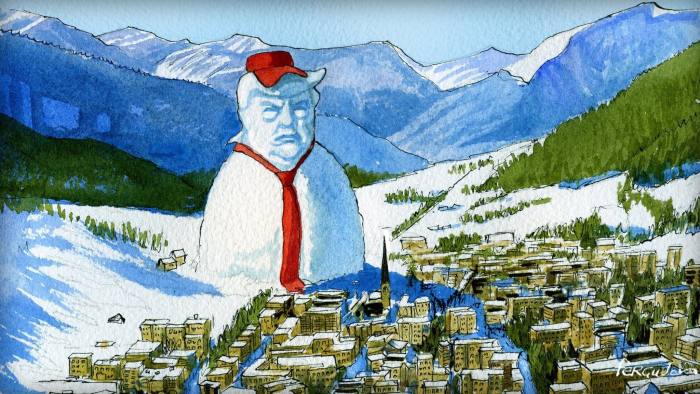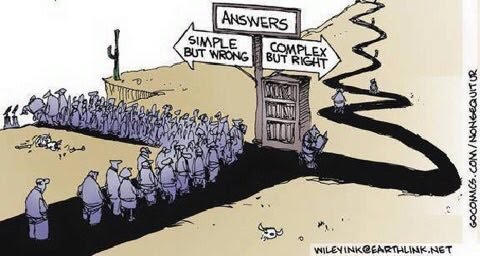Catarina Conti
Manager, Media Operations
Project Counsel Media
25 January 2020 (Davos, Switzerland) – The World Economic Forum (WEF) annual meeting. A bit overwhelming. And primarily attended by middle-aged men. Since we acquired WEF media credentials a number of years ago, this has been Greg’s solo journey but in the last two years he has brought me along. And as he begins his slide toward semi-retirement he has passed the baton to me so this year is was my solo run.
Yes, “Davos Man” is lost in a blizzard of complexity – plutocrats and politicians who still rule the world have been given a shock this year over climate change and artificial intelligence. Samuel Huntington must be laughing in his grave. More than a decade ago the prescient political scientist popularized the term “Davos Man” in an 2004 essay. And he was not being complimentary. He coined the phrase to symbolize the “emerging global superclass.” His essay on this trope was titled “Dead Souls.” The rootless, denationalized elites, he argued, were out of touch with ordinary people’s yearning for tradition and community. It was this theme that Trump’s onetime strategist Stephen Bannon invoked when he said Trump’s enemies were “the party of Davos.” In Huntington’s vision, the people gathered were the problem, a condescending cabal that sought to impose its homogenizing will on the world.
Still, I will say that WEF is a tsunami of content and fascinating conversations that all seem interesting … but which often you are not part of. In past years Greg attended via a “purple badge” (the badge reserved for technicians who work behind the scenes) which was courtesy of a long-time media client. After a long application process, he earned a media badge.
NOTE: The most coveted badge in all of Davos is one with a shiny holographic sticker on it — despite the fact that most attendees, and even some Forum employees, don’t actually know what the sticker means. It’s seen on the badge of every head of state, so some people thinks it means you are a head of state. It doesn’t. In fact, the shiny hologram grants you entry to the hyper-exclusive “Davos-within-Davos” known as IGWEL, or the Informal Gathering of World Economic Leaders. And inside the IGWEL there is a caste system. Jens Stoltenberg (Secretary General of NATO) is a “three”. Ursula von der Leyen (President of the European Commission and John Kerry are “ones”. And so on.
To get in, you need to be a senior government policymaker — think finance minister, or trade minister, or one of their sherpas — or one of a very select group of WEF employees. And in fact the exclusivity does seem to help: if anything useful has ever been achieved at Davos, it has probably been achieved at IGWEL, which remains one of very few occasions where international politicians can meet informally, off the record, to talk about their biggest aspirations.
Oh, and just for fun, here is the cost to attendees for mingling with the swells at Davos. You pay in Swiss francs but I have converted everything into U.S. dollars :
• An annual membership to the World Economic Forum (required if you want to buy a ticket to Davos) starts at $62,000 and can run to $660,000. A ticket to Davos itself costs $28,000 but the WEF waives the fee for all attendees who are not there to represent a business. But you still must have an annual membership to attend.
• The crappiest hotel rooms are $500 a night, and a private chalet costs $140,000 for the week. The good hotels raise their prices to five times their normal rate during the conference. We book an Airbnb for three years in advance and that averages out to $100 a night. But we pay for the whole three years in advance.
• If you want to go to the private industry sessions, which everyone here agrees are where the real value is, you have to become an “Industry Associate,” which costs $145,000 a year.
• If you want to bring a colleague, you can’t just buy another ticket for $28,000 — you have upgrade your membership to “Industry Partner,” which costs about $275,000.
• And that’s just the cost of the conference. If you want to throw a party at Davos, which every self-respecting corporate attendee does, it will set you back at least $350 per guest (I had a long chat with two of the catering companies that handle Davos). And you have to get here, which will cost you $1,000 – $100,000 depending on what size plane you fly in on (commercial or private) and whether you want to drive from Zurich or fly in a helicopter ($4,000).
So it’s no surprise that some companies spend “millions” on the Annual Meeting each year, as a senior executive at one big Davos sponsor told me.
And before I summarise my main points, a side take-away. The overwhelming predominance of America was so in-your-face. So many attendees said “Continental Europe has become a bit player”. Sure, Ursula von der Leyen drew a big crowd for her inaugural Davos appearance as the European Commission president, but European Parliament chief David Sassoli was an also-ran, and German Chancellor Angela Merkel’s keynote barely registered in conversations. American corporations (and a few British corporations) dominated, but their Continental fellows were far, far less visible. “It’s a cultural change”, one WEF official reckoned. “We’ve seen it coming”.
THE MAGICAL LANGUAGE OF DAVOS
Ah, the language here. Most of the panels are pretty dense. Like “Resilient Dynamism” and “Globalization 4.0: Shaping a Global Architecture in the Age of the Fourth Industrial Revolution.” Even the topics of conversation at Davos can be hard to decipher. Complicating things further, the conference also has its own jargon. Attendees use phrases like “material improbabilities,” “circularity,” and “resilience imperative” in ways that can only be understood by other WEF members. The BBC’s Joe Miller called Davos jargon “a crime against the English language.”
And, yes, Donald Trump, Greta Thunberg, Satya Nadella, Lenny Kravitz… there were a lot of big names here this week. But the person that generated the most buzz didn’t even have a name. You couldn’t walk 10 steps without overhearing someone talking about “stakeholders.” The s-word appeared in the title or description of no fewer than 13 sessions on the forum’s main program, and many more in the unofficial fringe.
This reflects the rapid shift in thinking about the purpose of companies. The Davos organizers unveiled a revamped manifesto this week, saying a company’s purpose should be to “engage all its stakeholders in shared and sustained value creation.” Last year nearly 200 of America’s top CEOs issued a similarly touchy-feely proclamation.
To me, it is all nothing more than woke-washing. Corporate bosses’ pay is still tightly tied to shareholder returns. If you really wanted to serve employees, communities, and the like, it would be more effective to make the case that doing so would boost profits. But the obstacle to taking things besides profit into account is that you can’t manage what you can’t measure. If I heard it once I heard it a thousand times: “the planet is a key stakeholder.” Ok, then just try to measure that. Environmental, social, and governance (ESG, this years’s acronym-of-choice, bandied about all week) measures are finding their way into portfolios at major asset management firms, but these broader concerns remain a niche proposition. So it’s encouraging that the Davosians (Davosiati? Davosoise?) this year agreed to develop some universal ESG measures everyone can agree on. That makes stakeholders the biggest winners of the World Economic Forum this year. Congratulations, whoever you are. Sorry it took so long.
THAT GUY
Yes, one would think Trump may represent the antithesis of everything the Davos crowd holds dear. He rejects the tenets of the liberal international order promoted by his country over seven decades. These values also animate the WEF. They are what make it something more than just a forum for the world’s rich and powerful. The last time Trump was here his trip was treated with deep skepticism, if not disdain. It was 2018 and even with his newly enacted tax cuts, his populist, antiglobalist rhetoric and Twitter outbursts were more than enough to make the event’s collection of plutocrats uneasy.
But now, this crowd is making a lot of money. Common view: C.E.O.s have come to accept Trump, in spite of his populist views and governance-by-Twitter style. Tax cuts and a record stock market speak volumes. And let’s be brutally frank. Trump and his cronies not only profit from, but *depend* upon, globalized kleptocracy. This system won the cold war. That victory, in turn, promoted a global shift towards democratic politics … and as Trump fully embraces, it also shifted to free-market economics. Jeffrey Sonnenfeld, the senior associate dean at the Yale School of Management, summed it up:
“Look, the Davos crowd are well respected followers of fashion and love whomever is in power. They celebrate when these people are rich and powerful.”
And why shouldn’t plutocrats “warm” to Trump? They are richer than ever and they, of all people, can buy their way out of whatever troubles come from his policies — climate change fueled fires, the violence brought by hate-mongering, worsening educational systems, and an economy on meth that benefits mostly the wealthiest. Cleary they’ve come to understand, and like the idea, that he will be their “useful idiot.”
The darkest side? The CEOs at Davos are architects of what amounts to crimes against humanity, and their jovial glee at riding high while billions suffer the devastating effects of their short-sighted greed is beyond disgusting. Unregulated capitalism is the driving force behind climate crises, widespread homelessness, crushing poverty, gaping income inequality, the global obesity epidemic, and the cancer-industrial complex. They make big tobacco look like pikers.
The lesson here is clear: lie, cheat, steal, stomp on anyone who stands in your way, violate the most ancient standards of decency or compassion, risk the future of the planet and the integrity of the world’s greatest democracies – none of that matters one iota. It is why, back in the U.S., his poll numbers are rising. Best story: the series of CNN interviews with Democrats who said “listen, my 401(k) is exploding. It pretty much died under Obama. So he cuts corners and cheats. We all do. I have a family to support, and I want to retire strong”.
What matters is the dollars, period.
“You will find me eager to help you, but slow to take any step” – Euripides, from “Hecuba”
The global elite promise a trillion trees and equality for all. Don’t hold your breath. Said Jean-Claude Juncker, then Luxembourg’s prime minister, in 2013:
“We all know what to do, but we don’t know how to get re-elected once we have done it. Do we care?”
The austerity programs that followed the global crash whipped up a populist storm from which the old politics has still to recover. History is in danger of repeating itself. As Juncker might say, the politicians know what they have to do about climate change, but beware the gilets jaunes. And the corporations.
The success of the populist movements that have destabilized Europe’s ancien regimes is rooted in a perception, more than half-true, that those near the bottom of the pile were burdened with bailing out the elites responsible for the financial crisis. The left-behinds rather than the bankers bore the brunt of austerity. Now think about cutting carbon emissions. The same group — low earners living in provincial towns and villages — are first in the line of fire.
With Donald Trump’s appearance at Davos, the phoney war about the climate is over. One way or another, I think global warming is set radically to reshape our economies and societies. Public opinion will no longer let politicians get away with a few fine words, a handful of wind farms and tax incentives for electric cars. Raging bushfires in Australia, melting glaciers in Greenland and unnerving shifts in weather patterns almost everywhere have disarmed all but the most obstinate climate deniers. Ask Scott Morrison, the Australian prime minister, who not so long ago exulted in his role of chief cheerleader for Australia’s coal industry.
I think business … grudgingly … will discover that a token nod in the direction of sustainability is insufficient. As ever, there has been an abundance of hot air in Davos, but corporate boards are feeling real pressure to take global warming seriously. More and more shareholders and stakeholders want to know how the boards are making their businesses climate friendly, and investors are beginning to shun the fossil fuel industry and companies large and small are being asked to produce green audits.
None of this makes the politics any easier. Even if the pledges made by dozens of governments to reach a net zero carbon world by 2050 look hopelessly ambitious, the promised policy upheaval is immense. Tax codes will have to be rewritten from scratch. Businesses will have to measure and reduce carbon content at every point in their supply chains. Financial institutions are already under pressure to cut their exposure to fossil fuels. Before long every company will be rated on its carbon footprint.
But … motorists will struggle to accept that the internal combustion engine has had its day — at least until someone invents a cheap battery with a decent range. The switch from coal, oil and gas to sustainable energy will require the replacement of hundreds of millions of household heating systems. Cheap flights will disappear. A shift from consumption of meat to plant-based products will not invite universal applause. Nor will the tax increases needed to finance decent public transport and better insulation of buildings.
The way to make this palatable (politicians think) is to wrap up the changes in “green deals” — huge packages calculated to harness public and private money, recalibrate taxes, subsidies and other incentives and compensate the biggest losers. It is going to be a struggle. Only this month the European Commission unveiled a €1tn programme to map the path to carbon neutrality by 2050. As pundits noted, it is a bold project … including hefty compensation for the big losers from shutting down fossil fuels production as well as tougher regulation and a cross-border carbon tax.
But no one, as far as I can see, has come up with plans to offset the cost of this on the people it will hurt most — those who need to drive to work in the ancient, gas-guzzling cars that spew out the most carbon; the householders least likely to have decent insulation or the cash to replace fossil fuel boilers; and the people for whom cheap air travel means a chance to take their one annual holiday.
These are the voters to whom Trump was speaking in Davos — the same ones who have fuelled the rise of populist parties of the far-right and left across Europe. Most often they live in small towns and villages beyond the big cities where sustainability has become a fashion statement. If anyone doubts their anger, they need only look at the gilets jaunes in France, whose year of protest against Emmanuel Macron began with an increase in fuel taxes.
A large swath of voters look at green policies through the same prism as Trump — something that wealthy globalists inflict on the poor when they are not hopping from continent to continent on their private jets. In their own minds, the left-behinds have already been swindled by globalisation and robbed by the bankers. They are in no mood to be cheated again. The question I have is whether the liberals leading the decarbonisation charge are ready to finance the big income transfers needed to make it politically sustainable.
A lot of this was covered in one of the best panels this year … the grimly titled “How to Survive the 21st Century” … where philosopher-historian-author Yuval Harari articulated a sophisticated vision of why we all should fear the future. It boils down to a trio of existential crises: nuclear war, ecological collapse, and technology. On the latter, he argued that artificial intelligence combined with biometrics means algorithms will know our biology, which is way scarier than the machines knowing whose post we liked or what shoes we bought. “We are no longer mysterious souls,” he said. “We are now hackable animals.” Somewhere out there, Jeff Bezos was nodding. The Harari panel deserves a longer post and I have handed my notes to Greg, who met Harari last year in Israel, for a longer piece he is writing.
The WEF sent out a press announcement about an artificial intelligence (AI) toolkit for corporate boards. The release pointed to a section of their web site titled Empowering AI Leadership. As would be expected from an organization focused on a select few in the world, the AI toolkit is high level. Boards of directors have broad but shallow oversight over companies, so there is no need to focus on details. But AI took up a large part of the sessions this year.
Amongst the AI programs there was a very good “introductory discussion” on how few of us understand the “architecture within which we live”. We have moved into an “internet singularity” where most of us are connected and living off a totally man-made system. Panelists discussed how that architecture is:
1. algorithmically-driven
2. subject to an almost uncontrollable connectivity, and
3. now subject to an exponential growth in cyber threat avenues
As Greg has noted in previous posts, no country has even come close to the U.S. in harnessing the power of computer networks to create and share knowledge, produce economic goods, intermesh private and government computing infrastructure, etc. — and so left the U.S. as the most vulnerable technology ecosystem to those who can steal, corrupt, harm, and destroy public and private assets, at a pace often found unfathomable.
The continuing issue which will be most difficult to overcome: the “capitalistic mindset” – get to the market quickly, in the least expensive fashion, building functionality first, security second. And on a threat level, the overriding fears of the panel: the barriers to technology are non-existent. Looking at the three “Horsemen of the Apocolypse” …
1. IEDs (improvised explosive devices)
2. drones
3. cyber
…. anybody can build these, can do it, not just the nation-state anymore. We already know ISIS had built drones with IEDs, and intelligence officials have already discovered weaponized drones across Africa and Mexico.
There was a session on ethics. Ethics are an important component (well, ok, in theory) to the management of companies. The WEF pointed out at the beginning of that module that “technology companies, professional associations, government agencies, NGOs and academic groups have already developed many AI codes of ethics and professional conduct.” The statement reminds me of the saying that standards are so important that everyone wants one of their own. The module then went on to discuss a few of the issues of the different standards – with the panelists ending in frustration saying “ok, ethics in AI is not going to be easy”. Welcome to the club.
And … no surprise … everybody seemed to be in agreement: minimal governmental regulation: “It’s all up to the brave and ethical company”. Well, Zuckerberg’s decision that Facebook will allow lies in political advertisements as long as it makes the firm and himself wealthier is certainly a clear argument that governments must be more active in setting guidelines on technical companies, both in at large and within the AI arena.
CONCLUSION
Whether you think the World Economic Forum is a worthy enterprise or a bunch of baloney and just fat cats whining, it’s an extraordinary creation. It is a tsunami of content and fascinating conversations that all seem interesting but, as I noted, of which often you are not part of. One fundamental underpinning in all of this is the accelerating volume and velocity of information. Cultures, institutions, and individuals are, among many other things, information-processing mechanisms. As they become overwhelmed with information complexity, the tendency to retreat into simpler narratives becomes stronger.
The speed of upheaval in our lives is unprecedented. It is why we go to so many events and conferences like Davos.






